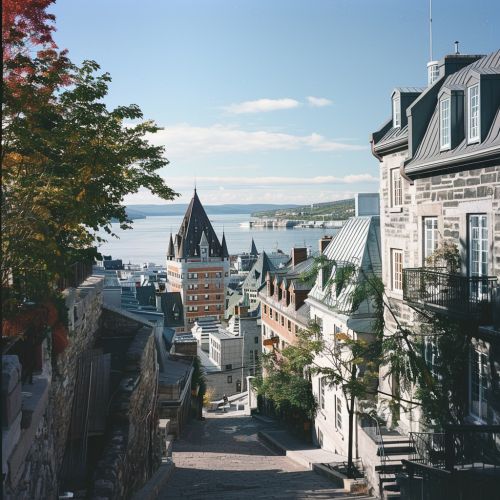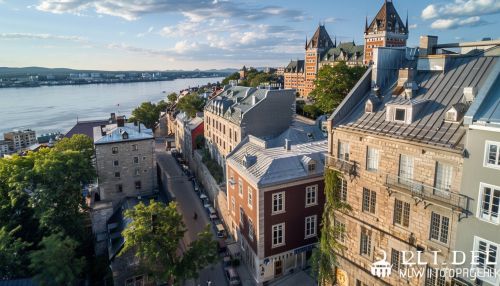History of Quebec
Early History
The history of Quebec, a province in Canada, is deeply rooted in the rich tapestry of Indigenous cultures and European colonization. Prior to European contact, the region was inhabited by various Indigenous peoples, including the Iroquois, Algonquin, and Innu nations. These groups had established complex societies with distinct languages, cultures, and social structures.
French Colonization
In 1534, French explorer Jacques Cartier arrived in the region, marking the beginning of European interest in what would become Quebec. Cartier's expeditions laid the groundwork for future French claims to the territory. In 1608, Samuel de Champlain founded Quebec City, which became the administrative center of the colony of New France.


The French colonization of Quebec was characterized by the establishment of fur trading posts and the development of agricultural settlements along the St. Lawrence River. The seigneurial system was introduced, which structured land distribution and social hierarchy in the colony.
British Conquest
The Seven Years' War (1756-1763) was a pivotal conflict that led to the British conquest of Quebec. The Battle of the Plains of Abraham in 1759 was a decisive moment, resulting in the British capture of Quebec City. The Treaty of Paris (1763) formally ceded New France to Britain, and the colony was renamed the Province of Quebec.
Under British rule, the Quebec Act of 1774 was enacted, which allowed the French-speaking population to retain their language, religion, and legal system. This act was significant in preserving the unique cultural identity of Quebec within the British Empire.
19th Century Developments
The 19th century was a period of significant change and development in Quebec. The War of 1812 saw Quebec as a strategic location in the conflict between Britain and the United States. The Rebellions of 1837-1838 in Lower Canada (now Quebec) were driven by demands for political reform and greater autonomy from British rule. These rebellions ultimately led to the Act of Union 1840, which merged Upper and Lower Canada into the Province of Canada.
The latter half of the 19th century saw the rise of the Confederation movement, culminating in the creation of the Dominion of Canada in 1867. Quebec became one of the four founding provinces, alongside Ontario, New Brunswick, and Nova Scotia.
20th Century and Modern Era
The 20th century brought industrialization and urbanization to Quebec, transforming its economy and society. The Quiet Revolution of the 1960s was a period of intense social, political, and cultural change, characterized by the secularization of society, the expansion of the welfare state, and the rise of Quebec nationalism.
The Parti Québécois, a political party advocating for Quebec sovereignty, was founded in 1968. The party's leader, René Lévesque, became Premier of Quebec in 1976. The 1980 Quebec referendum on sovereignty-association was held, but the proposal was rejected by a majority of voters.
In 1995, a second referendum on Quebec independence was held, resulting in a narrow defeat for the sovereignty movement. Despite these setbacks, the question of Quebec's status within Canada remains a significant issue in provincial and national politics.
Cultural and Linguistic Identity
Quebec's cultural and linguistic identity is a defining feature of the province. The Charter of the French Language, also known as Bill 101, was enacted in 1977 to promote and protect the use of French in Quebec. The law mandates French as the official language of government, commerce, and education.
The province is known for its vibrant cultural scene, including its contributions to literature, music, and the arts. Quebec's film industry has gained international recognition, and the province hosts numerous cultural festivals, such as the Montreal International Jazz Festival and the Quebec Winter Carnival.
See Also
- Iroquois
- Jacques Cartier
- Samuel de Champlain
- New France
- Seigneurial system
- Seven Years' War
- Battle of the Plains of Abraham
- Treaty of Paris (1763)
- Quebec Act of 1774
- War of 1812
- Rebellions of 1837-1838
- Act of Union 1840
- Province of Canada
- Dominion of Canada
- Quiet Revolution
- Parti Québécois
- René Lévesque
- 1980 Quebec referendum
- 1995 Quebec referendum
- Charter of the French Language
- Bill 101
- Montreal International Jazz Festival
- Quebec Winter Carnival
